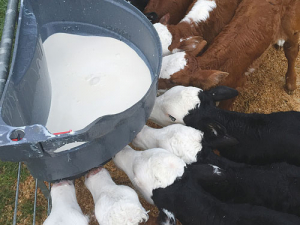Trina Parker, of BEC Feed Solutions, says the biggest risk is posed by feeding raw waste milk or colostrum bought in by beef calf or replacement heifer calf rearers to feed their young animals. This has been identified as a high-risk practice, as raw milk or colostrum is likely to come from various farms, is untraceable and is likely to be from mastitis/unwell cows.
Onfarm feeding of colostrum and raw milk from farmers’ own cows to their young stock and replacements is also a biosecurity ‘weak link’ practice, because the disease can be difficult to detect in the early stages so it may spread to the next generation unknowingly.
Good biosecurity requires that each farm sticks to best practice.
Acidifying milk is relatively easy and effective when done correctly, she says. It allows farmers to use their own milk to feed calves.
The company has launched a calf-rearer’s product called PKA -- an acidifier for treating milk.
In recent years, supply pressure has limited the availability of powdered CMR later in the season. PKA provides another option, sold by vet practices -- a simple, safe, accurate and effective way to treat raw milk for calves this spring, says Parker.
“PKA has been laboratory tested in New Zealand to determine the dose rate requirements for acidifying raw milk to meet industry recommendations of less than pH5.
“It’s easy to use, has no acid taste and comes with accurate dose instructions to enable farmers to maintain pH lower than 5 (ideally 4.5) in their raw milk for at least eight hours.”
Parker says milk acidified with PKA is suitable for feeding to calves. It helps prevent disease transmission and can improve milk curdling and overall digestion.
DairyNZ has suggested the use of citric acid to reduce the pH of raw milk to the required 4.5 - 5.0 for a least eight hours. But the high dose of citric acid required suggests the milk will be sour and potentially unpalatable to calves if over-dosed and the pH reduces any further; PKA offers an alternative.
Parker says treatment options should be discussed with a veterinarian.









